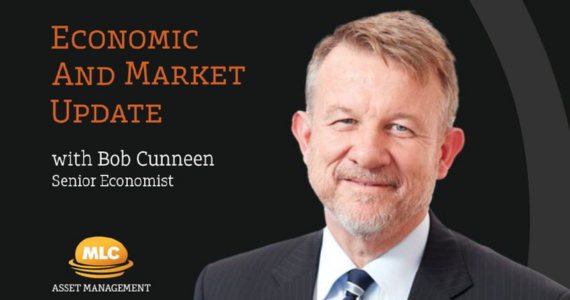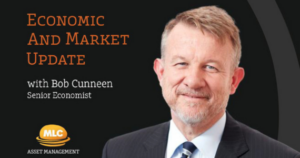Key events in May 2025
- Global share prices made strong gains in May on hopes that US President Trump’s tariffs will prove more modest than April’s announcements. President Trump has agreed to a temporary tariff truce of 90 days with both China and Europe in May.
- US share prices have continued their remarkable recovery from April lows. Investors have taken comfort with the US President suggesting that tariff deals are negotiable. Hence, April’s alarm that large tariffs would lead to a US recession, higher inflation, as well as lower corporate profits, has abated. However, President Trump has selectively threatened to raise tariffs on imported aluminium and steel from 25% to 50% and apply a 25% tariff on Apple iPhones in the final days of May. This suggests that tariffs are still a contentious issue and a weapon for the White House. US economic activity has been modest, with consumers cautious about retail spending despite a solid jobs market and lower energy prices.
- Chinese shares rebounded with signs that China-US trade talks were making progress. China has agreed to lower tariffs on US imports from 125% to 10% in response to the US lowering their tariff rates from 145% to 30% awaiting final negotiations.
- Australian shares tracked the upswing in global shares. The Information Technology sector made remarkable monthly gains of 18.8% with WiseTech rebounding on a US technology firm acquisition. The Energy sector surged by 8.7% which was led by Woodside on news that the Federal Government had extended approval for their gas export facility. There were also strong +5% gains for Communication Services, Financial and Real Estate sectors which benefitted from the Reserve Bank of Australia (RBA) cutting the cash interest rate by 0.25% to 3.85%.
- Australia’s economic data provides a subdued profile. Both housing construction approvals and retail spending fell in April with consumers still cautious given the “cost of living”. However, there was a positive surprise with strong jobs growth in April and unemployment remaining steady at 4.1%.
Asset class summary
Asset class returns in Australian dollars – periods to 31 May 2025
|
|
CYTD % | 1 month
% |
3 months
% |
1 year
% |
3 years pa % |
5 years pa % |
10 years pa % |
|
Australian shares |
4.9 | 4.2 | 4.3 | 13.2 | 9.3 | 12.0 | 8.1 |
|
Global shares (hedged) |
3.0 | 5.6 | 0.5 | 11.8 | 11.3 | 12.4 | 9.0 |
|
Global shares (unhedged) |
1.3 | 5.1 | –0.9 | 17.4 | 16.4 | 14.1 | 11.2 |
|
Emerging markets (unhedged) |
4.6 | 3.7 | 2.7 | 16.8 | 9.0 | 7.7 | 5.7 |
|
Australian property securities |
4.2 | 4.9 | 6.2 | 12.1 | 10.1 | 11.8 | 7.9 |
|
Global property securities (hedged) |
2.8 | 2.5 | –0.7 | 8.7 | –0.7 | 4.8 | 2.5 |
|
Global listed infrastructure (hedged) |
6.0 | 1.6 | 3.4 | 11.9 | 3.2 | 6.5 | 6.2 |
|
Australian bonds |
3.2 | 0.2 | 2.0 | 6.8 | 3.1 | –0.2 | 2.1 |
|
Global bonds (hedged) |
1.7 | –0.4 | 0.1 | 5.3 | 1.4 | –0.7 | 1.8 |
|
Global high yield bonds (hedged) |
2.7 | 1.6 | 0.7 | 7.4 | 4.6 | 3.9 | 4.2 |
|
Australian inflation-linked bonds |
2.4 | 0.6 | 1.6 | 5.1 | 4.4 | 2.9 | 2.6 |
|
Cash |
1.8 | 0.3 | 1.0 | 4.4 | 3.8 | 2.3 | 2.0 |
|
AUD/USD |
3.9 | 0.6 | 3.5 | –3.2 | –3.6 | –0.6 | –1.7 |
Past performance is not a reliable indicator of future performance. Sources: Australian shares – S&P/ASX 300 Total Return Index; Global shares (hedged) – MSCI All Countries World (A$ hedged, Net); Global shares (unhedged) – MSCI All Countries World in A$ (Net); Emerging markets – MSCI Emerging Markets in A$ (Net); Australian property securities – S&P/ASX 300 A-REIT Accumulation Index; Global property securities – FTSE EPRA/NAREIT Developed (A$ hedged, Net); Global listed infrastructure – FTSE Global Core Infrastructure 50/50 (Hedged $A); Australian bonds – Bloomberg AusBond Composite 0+ Yr Index; Global bonds (A$ hedged) – Barclays Global Aggregate (A$ hedged, Gross); Global high yield bonds (A$ hedged) – Barclays US High Yield Ba/B Cash Pay x Financials ($A Hedged); Australian inflation-linked bonds – Bloomberg AusBond Inflation Government 0+ Yr Index; Cash – Bloomberg AusBond Bank Bill Index; AUD/USD – WM/Reuters Daily (4 pm GMT).
Key events in global markets over the last three months to May 2025
Global shares (hedged) endured a turbulent experience but ultimately posted a subdued 0.5% return over the three months to May 2025. President Trump’s aggressive agenda of raising tariffs saw share markets fall sharply in March and early April but then make a strong recovery to deliver a modest positive return. For global shares (unhedged), the stronger Australian dollar has served to reduce the quarterly return to a mildly negative -0.9%.
Wall Street’s benchmark S&P 500 Index fell sharply from their historic highs in February given tariff concerns. President Trump’s announcement of a “90 day pause” on tariffs provided the catalyst for US shares to recover most of their losses although the S&P 500 ended down -0.5% (in local currency terms).
Asian share markets delivered impressive performances. Both Indian (13.4%) and Hong Kong (10.2%) listed shares posted very strong returns in local currency terms over the past three months. Japanese share markets delivered a 5% return, in local currency terms, with the central bank taking a more cautious stance on raising interest rates given President Trump’s tariff agenda.
Global bonds (hedged) delivered a flat 0.1% quarterly return with investors concerned about the immediate upside inflation risks with tariffs. Australian bonds delivered a solid 2% return as the recent lower inflation results has seen investors become more optimistic that the RBA will continue to cut interest rates this year.
Key events in Australia over the last three months to May 2025
Australian shares provided a positive surprise with a 4.3% return despite the global turmoil. The sharpest gain was in the Information Technology sector with a 14.8% return largely due to a recovery in WiseTech shares. There were notable positive returns for the Communication Services (8.4% return), Financial (6.6%) and Property securities (6.2%) sectors which benefitted from the RBA cutting the cash interest rate by 0.25% to 3.85% in May.
Australia’s economy continues to experience slow economic activity in terms of retail spending and housing construction. However, there are encouraging rays of sunshine with lower inflation. Australia’s annual inflation rate declined to 2.4% in the March quarter which offers the prospect for further interest rate cuts in 2025.
Global prospects
Global share prices made very strong gains in 2023 and 2024. The enthusiasm for Artificial Intelligence (AI) and technology have been the key factors supporting global rising share prices. There has also been the recent tailwind of lower global inflation that allowed central banks to cut interest rates. Typically, a lower interest rate environment is supportive of corporate profits and thereby share prices.
However, the return of Donald Trump to the White House has generated alarm over the imposition of large tariffs on America’s key trading partners as well as smaller players like Australia. Given that tariffs are a tax that increases consumer prices, the risk of a sharp rise in US inflation is a clear and present danger. If the Trump Administration actually implements the proposed tariff increases after the current 90 day pause and if China and other trading partners retaliate, then the risk of higher inflation and weaker economic activity magnifies across the world.
Hence President Trump’s aggressive policy agenda – higher tariffs that impose more difficult trading conditions for the global economy, lower US immigration and population growth with “mass deportations” and a tougher US Federal Budget with cuts to government jobs and spending – is not a recipe for economic and financial stability.
Global share markets are also being challenged by considerable global political risks. The continuing Russian-Ukraine war and conflict in the Middle East also provides a troubling environment.
Given these complex and significant risks, investors should maintain a disciplined and diversified strategy.
Important information This communication is provided by MLC Investments Limited (ABN 30 002 641 661, AFSL 230705) (MLC), part of the Insignia Financial Group of companies (comprising Insignia Financial Ltd, ABN 49 100 103 722 and its related bodies corporate) (‘Insignia Financial Group’). An investment with MLC does not represent a deposit or liability of, and is not guaranteed by, the Insignia Financial Group. This information may constitute general advice. It has been prepared without taking account of an investor’s objectives, financial situation or needs and because of that an investor should, before acting on the advice, consider the appropriateness of the advice having regard to their personal objectives, financial situation, and needs. Past performance is not a reliable indicator of future performance. Share market returns are all in local currency. Any opinions expressed in this communication constitute our judgement at the time of issue and are subject to change. We believe that the information contained in this communication is correct and that any estimates, opinions, conclusions or recommendations are held or made as at the time of compilation. However, no warranty is made as to their accuracy or reliability (which may change without notice), or other information contained in this communication. This information is directed to and prepared for Australian residents only. MLC may use the services of any member of the Insignia Financial Group where it makes good business sense to do so and will benefit customers. Amounts paid for these services are always negotiated on an arm’s length basis. MLC relies on third parties to provide certain information and is not responsible for its accuracy, nor is MLC liable for any loss arising from a person relying on information provided by third parties. Bloomberg Finance L.P. and its affiliates (collectively, “Bloomberg”) do not approve or endorse any information included in this material and disclaim all liability for any loss or damage of any kind arising out of the use of all or any part of this material. The funds referred to herein is not sponsored, endorsed, or promoted by MSCI, and MSCI bears no liability with respect to any such funds.



